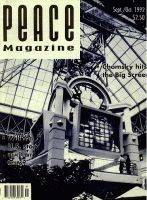
Peace Magazine Sep-Oct 1992, page 29. Some rights reserved.
Search for other articles by Metta Spencer here
Do you wish Canada's referendum covered your own pet concerns? Well, cheer up. Peace Magazine is going to run a referendum of our own, unrelated to Canadian unity, and if you participate, you have a real chance of winning. This is a different kind of referendum-an interesting experiment with a serious purpose that I'll explain later. The structure committee of Helsinki Citizens Assembly is considering ways to make certain common voting practices more democratic. As chairperson of that committee, I invite you and your friends (who don't have to be subscribers) to participate in simulating a type of referendum in which minorities can win with the full support of the majority. The whole experiment will take place over the next four issues.
This time, the readers who want to participate will begin to form certain constituencies, based on group identity, and you'll propose one issue that you would like to have a chance to vote on. In November, you'll have a chance to single out the highest priority issue for your constituency. The following issue January/February) will include the referendum ballot and the instructions for voting. Finally the March issue (March/April) will report the results. I'll explain the rationale and value of this unusual process as we go along. If you want your friends and relatives to participate, just photocopy this page and give everyone a copy. MI interested participants are welcome!
Step One: Defining Your Constituency
When you vote in Canada's constitutional referendum, your vote will be added to all the others in your riding, a particular geographical district. In Peace Magazine's referendum, your vote will be added to all the others in your constituency, which will not be based on where you live but on your social identity. Your social identity is not your party, but another factor which is important to you. It may be your linguistic group (Francophone, Anglophone, or some other tongue) or your religion (Catholic, say, or Protestant or Jewish, or perhaps Hindu or Greek Orthodox). Or perhaps you identify yourself most as a Ukrainian, a trade unionist, a feminist, a student, a farmer, or an animal rights activist, etc.. The only limit is this: If you choose a constituency (e.g. Mandarin speakers) which includes less than three percent of the total number of voters, you will have to join some larger constituency instead. Each constituency must comprise at least three percent of the votes. However, if you can persuade enough friends to join your Mandarin constituency to make up three percent of the voters, that's okay-whether or not they actually speak Mandarin. You and your friends may vote even if you don't live in Canada. List three of your group identities below, and we'll try to put you into one of them.
First choice
Second choice _________
Step Two. Proposing Topics for a Referendum
If you have ever lived in Switzerland or California, you will be familiar with referendums and "direct democracy." Every year, each citizen is allowed to vote on a series of ten or twenty "propositions" which become law if they win the approval of the majority. (Of course, elected legislators make laws too.) In the space below, please propose one "proposition" to be placed on our referendum. The response to it will be either "Yes" or "No" but there will be an unusual system of weighting the votes, as I'll explain later. You may want to suggest a proposition that is relevant to your own preferred constituency, though this is not required.
Here are some examples of propositions that have been suggested in previous experiments with this system.
"The government of Canada should not purchase a fleet of new helicopters, but spend the money on day care instead."
"The use of animal fur for human clothing should be prohibited."
"Students should have an opportunity to study their native language in class at least one hour each day."
In the space below, please write a proposition that you want to see placed on Peace Magazine's referendum.
Mail your response to 736 Bathurst St. Toronto M5S 2R4 in time to reach us by October 12. Thanks for participating! Watch the next issues of Peace Magazine for the following stages of this experiment'.

Peace Magazine Sep-Oct 1992, page 29. Some rights reserved.
Search for other articles by Metta Spencer here